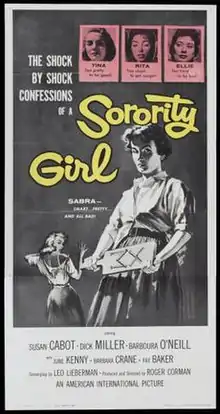Sorority Girl
Sorority Girl (also known as Sorority House or The Bad One) is a 1957 film noir exploitation film directed by Roger Corman. It stars Susan Cabot as Sabra, a sociopath who plays a very disruptive role in a sorority, with Barboura Morris as Rita, and Dick Miller and June Kenney. It was released by American International Pictures as a double feature with Motorcycle Gang.[1]
| Sorority Girl | |
|---|---|
 Film poster by Albert Kallis | |
| Directed by | Roger Corman |
| Written by | Leo Lieberman Ed Waters |
| Produced by | Roger Corman |
| Starring | Susan Cabot Barboura Morris |
| Music by | Ronald Stein |
Production company | Sunset Productions |
| Distributed by | American International Pictures |
Release date |
|
Running time | 62 mins. |
| Country | United States |
| Language | English |
In England it was known as The Bad One.[2] The film was remade in 1994 as Confessions of a Sorority Girl.
Plot
A spoiled rich girl named Sabra Tanner (who feels ignored by her rich mother) teases and harasses her college schoolmates even though she doesn't know why she wants to hurt all the people around her. Her sociopathic antics bring bad consequences for her when her actions drive one of her classmates to suicide. Realizing she is completely ostracized, Sabra walks into the ocean to drown herself.
Cast
- Susan Cabot as Sabra Tanner
- Dick Miller as Mort
- Barboura Morris (credited as Barboura O'Neill) as Rita Joyce
- June Kenney as Tina
- Fay Baker as Mrs. Tanner
- Barbara Cowan (credited as Barbara Crane) as Ellie Marshall
- Jeane Wood as Mrs. Fessenden, the housemother
Production

Corman says that the script was developed by AIP. He did not like it and had some of it rewritten, although not as much as he liked.[3]
Shooting started on 15 July 1957 at Ziv Studios.[4] Filming also took place at the mansion of Ruta Lee in Laurel Canyon.[5]
Susan Cabot later recalled working on Corman films:
We would have some sort of a script, but there was a lot of, “Who’s going to say what?” and “How ’bout I do this?’ ’ — plenty of ad-libbing and improvising. But Roger was really great in a way; he was very loose. If something didn’t work out, he changed it right away. He gave me a great amount of freedom , and also a chance to play parts that Universal would never have given me — oddball, wacko parts, like the very disturbed girl in Sorority Girl. I had a chance to do moments and scenes that I didn’t get before.[6]
Corman says while filming he made Cabot do an emotional scene in medium shot first, then when it was time to do a close up, Cabot's performance was not as strong. Corman says this prompted him to learn more about acting, so he enrolled in acting classes given by Jeff Corey, where he would meet people like Jack Nicholson and Robert Towne.[7]
Release
The film was issued on a double bill with Motorcycle Gang.[8][9]
The Christian Science Monitor said it had a "sad hodgepodge of a story".[10]
See also
References
- Sanders, Don and Susan (1997). The American Drive-In Movie Theatre. Motorbooks International. p. 121. ISBN 0-7603-0425-4.
- BAD ONE, The Monthly Film Bulletin; London Vol. 25, Iss. 288, (Jan 1, 1958): 60.
- Ed. J. Philip di Franco, The Movie World of Roger Corman, Chelsea House Publishers, 1979 p 10
- MOVIELAND EVENTS: Screen Writing Gets Remarque Attention Los Angeles Times 5 July 1957: A5.
- Weaver, Tom (2004). "The Saga of a Corman Stock Player". Cult Movies. No. 41. pp. 52–59.
- "Wasps! Vikings! Sea Serpents!". Fangoria. No. 52. 1986.
- Corman, Roger; Jerome, Jim (1998). How I made a hundred movies in Hollywood and never lost a dime. Da Capo Press. pp. 42–43.
- Gary A. Smith, American International Pictures: The Golden Years, Bear Manor Media 2013 p 64
- Romances of Cycle Hounds Told in Film C S. Los Angeles Times 22 Nov 1957: B12.
- 'Sorority Girl' At Paramount N.E.T. The Christian Science Monitor 12 Dec 1957: 8.